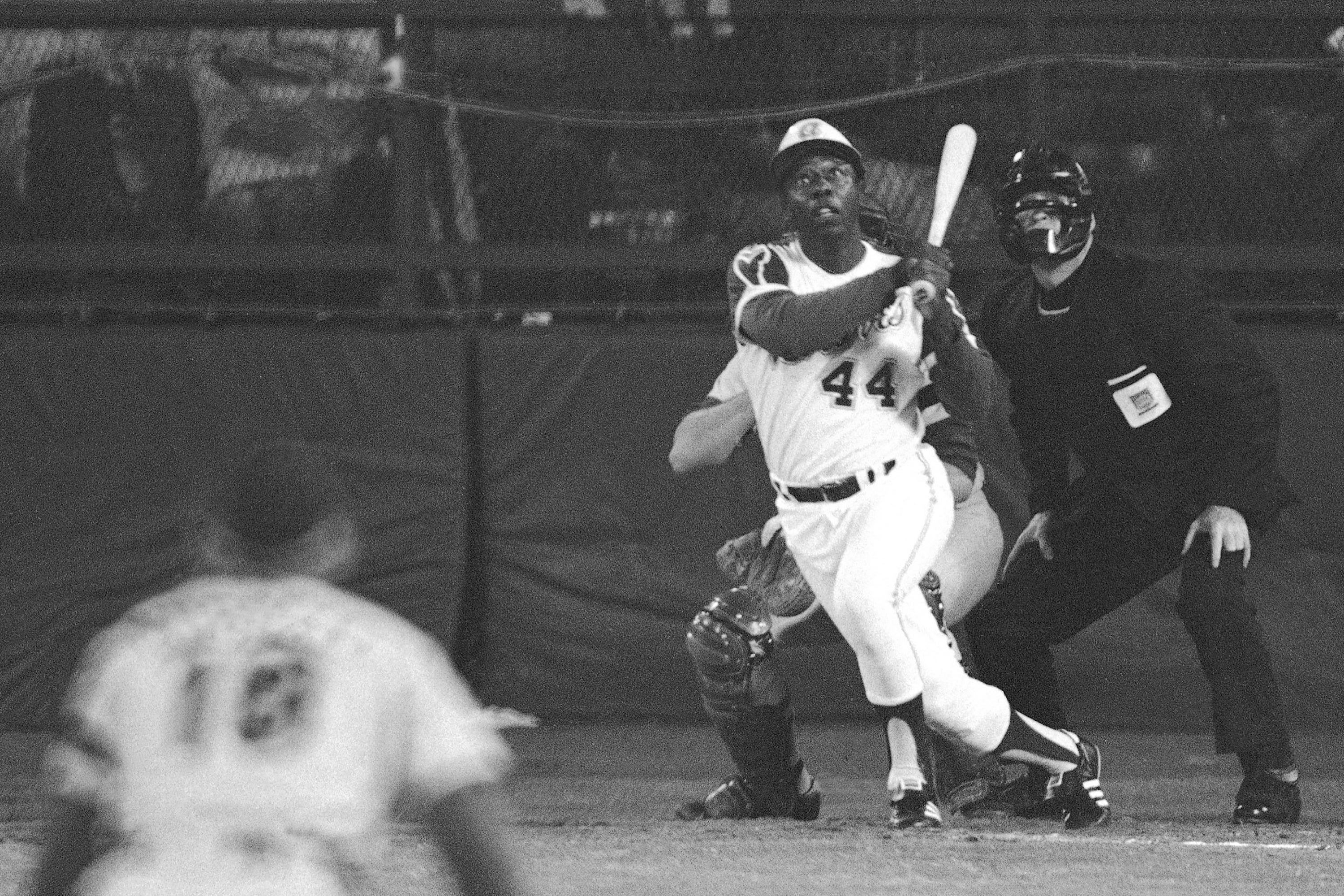Timeline of Hank Aaron’s life and career
A timeline of Hank Aaron’s life and career

A timeline of Hank Aaron’s life and career:
1934 — Born on Feb. 5 in a section of Mobile, Alabama, known as “Down The Bay.”
1951 — Signs at age 17 with the Indianapolis Clowns of the Negro American League, where he plays shortstop and draws the attention of major league scouts.
1952 — Signs with the Boston Braves, turning down a slightly lower offer from the New York Giants that could’ve paired him in the same outfield with Willie Mays.
1954 — Earns a spot in the big leagues with the Braves, who had moved to Milwaukee before the 1953 season. After going 0-for-5 in his debut on April 13, Aaron hits .280 with 13 homers and 69 RBIs to finish fourth in the NL Rookie of the Year voting.
1957 — Earns his only NL MVP award, leading the league with 44 homers and 132 RBIs while batting .322. The Braves win the pennant and defeat Mickey Mantle’s New York Yankees 4-3 for what would be the only World Series victory of Aaron’s career He is one of the standouts of the series, hitting .393 with three homers and seven RBIs.
1958 — Braves repeat as NL champions and again face the Yankees in the World Series. Milwaukee is within one victory of its second straight championship but loses the final three games. Aaron hits .333 with two RBIs in the series.
1963 — Nearly wins the Triple Crown, leading the league with 44 homers and 130 RBIs but losing out on the batting title to Tommy Davis of the Los Angeles Dodgers (.326 to .319). Aaron does become only the third player in major league history to make the 30-30 club with a career-best 31 stolen bases.
1966 — The Braves move from Milwaukee to Atlanta, becoming the first major league team in the Deep South at a time when the region is still embroiled in the fight for civil rights.
1968 — Hits his 500th homer against Mike McCormick of the San Francisco Giants on July 14.
1969 — Makes his final postseason appearance when the Braves win the NL West title in baseball’s first year under a new divisional format. Atlanta is swept by New York’s Amazin’ Mets 3-0 in the inaugural league championship series, even though Aaron hits .357 with three homers and seven RBIs.
1970 — Collects his 3,000th hit against Wayne Simpson of the Cincinnati Reds on May 17, becoming the first player to reach 500 homers and 3,000 hits.
1971 — Hits his 600th career homer off San Francisco’s Gaylord Perry on April 27, joining Willie Mays and Babe Ruth as the only players to reach that milestone.
1972 — Passes Mays for second place on the career homer list, finishing the season with 673 and setting his sights on Ruth’s record of 714.
1973 — Hits his 700th homer off Philadelphia’s Kenn Brett on July 21. Aaron finishes the season one shy of Ruth’s record.
1974 — Despite intense pressure and death threats that required constant security, ties Ruth’s mark on opening day in his first at-bat of the season, going deep off Cincinnati’s Jack Billingham at Riverfront Stadium on April 4.
1974 — Becomes baseball’s new home-run king on April 8 in the Braves’ home opener at Atlanta Stadium. Before a record crowd of more than 53,000 and a national television audience, Aaron hits a 1-0 pitch from Al Downing over the left-field fence for his 715th homer.
1975 — After turning down a front-office offer from the Braves that paid significantly less money, Aaron is traded to Milwaukee to serve as the Brewers’ designated hitter and finish his career where it started. He hits .234 with 12 homers and 60 RBIs and makes the last of his record 25 All-Star Game appearances at County Stadium, lining out to shortstop as a pinch-hitter in the second inning.
1976 — Hits his 755th and final home run July 20 at Milwaukee’s County Stadium off Dick Drago of the California Angels. Aaron retires at age 42 after hitting just .229 with 10 homers and 35 RBIs in the final season of his 23-year career.
1977 — Makes amends with the Braves, beginning a long stint in the front office.
1982 — Elected to the Baseball Hall of Fame on the first ballot, coming nine votes short of being the first unanimous selection.
1989 — Moves into a largely ceremonial role with the Braves after being in charge of player development.
1999 — Honored by Major League Baseball with the Hank Aaron Award for the top hitter, akin to the Cy Young for pitchers.
2002 — Awarded the Presidential Medal of Freedom by President George W. Bush, who honors Aaron with the nation’s highest civilian honor for overcoming “poverty and racism to become one of the most accomplished baseball players of all time.”
2021 — Died in his sleep on Jan. 22.
___
More AP MLB: https://apnews.com/MLB and https://twitter.com/AP_Sports
Bookmark popover
Removed from bookmarks